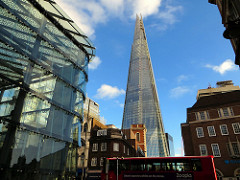clear

source:
Simon / Flickr
As the capital of England, you would expect London to be the powerhouse for business attracting many diverse industries. However, I do believe that it has gone a little too far, and London is becoming overcrowded with businesses and people. There are many great cities in the UK open for business and cities which are very well connected to the capital too. It just seems that no-one wants to give these other cities a real good chance. Birmingham, Leeds and Manchester are three vibrant and thriving cities which are home to many industries and walks of life. However, it's not enough to draw the big guys out of the capital. London is too crammed with high rise flats and is seeing an ever expanding area in the South East of England. More and more people flock to London for work rather than being drawn to these other magnificent cities. The UK is far too London centric and more needs to be done to bring other major cities into the limelight.
 0
0
clear
London is home to many fine museums, galleries and places of entertainment. But then again, so are many other cities. In fact, there are many gems around the country but they don't get as many visitors as they deserve. While the queues for the National History might go around the block on a bank holiday, a regional museum is more likely to be half empty on the same day. Many regional museums and galleries are starting to address this by making their offering less "dusty", and more interactive. They are also adding good quality cafes that make the museums more of a "treat" to visit. So no, the UK isn't too London centric but people just need to prick up their ears and see what's happening locally!
 0
0
clear
Unlike other countries in Western Europe – France, Germany, the Netherlands or the Scandinavian nations – the UK is unusual in being so monocentric. As a rule, most developed countries have networks of cities with economic specialties. But successive UK governments have promoted policies aimed at channeling wealth into its capital at the expense of its other cities.
As a result of London-centric policies, that city has developed a monopoly on the financial industries, as well as legal services, culture, media and technology, not to mention government. The housing market here has spiraled out of control, pricing ordinary Londoners out of the city that has been home for generations in favour of rich overseas developers. Blocks of the most exclusive properties are purchased by oligarchs from Russia or the Middle East only to sit empty for most of the time. The city’s streets have become so suggested that public services struggle to cope with the demand for commuter transport.
London's magnetic draw inevitably leads to the UK’s equally vibrant but less-populated centres receiving less investment. One reason cited for the country's vote in favour of ‘Brexit’ was the sense of disconnection felt by provincial Britons.
There are moves afoot to distribute business opportunities more evenly, through greater autonomy for English cities, and a high-speed rail link between northern centres of population. The UK parliament at Westminster represents a massive drain on resources, with calls for regional assemblies to rival the devolved governments in Scotland, Wales and Northern Ireland. Of course, the fact that Scotland’s EU vote was the emphatic opposite of England's means the London-centric UK may well be facing even more upheaval in the near future.
 0
0
clear
There have been some attempts to 'share the wealth' that London enjoys, in terms of its monopoly on government, media and finance. The BBC moved some key infrastructure to Salford (a small city adjacent to Manchester) and the Media City site there has been joined by other broadcasters, such as ITV. There have also been attempts to move parts of the civil service outside of London. The Drivers and Vehicle Licensing department has long been based in Wales, very far from London, but recent plans to move civil servants out of Whitehall is set to send them to Canary Wharf or Croydon, both very much in London, if not central London.
Many argue that 'Stalinist' attempts to reshape the country's infrastuctre will only damage the insititutions taht get exiled from london, given that ease of access makes it much more practical for branches of government or the media to work together adn interact. But for such a physically small country, some may find it odd that such interaction is only possible within a ten square mile area.
There are suggestions that the planned HS2 High Speed rail link will allow this devolution of companies and institutions from London, by reducing travel times out of the capital. However, experts suggest that the travel link will mot likely work in reverse, acting as a brain drain on cities in the north of England as they are drawn into London, where all the work and contacts and excitement is.
Whatever way its approached, ending the London-centricity of England, and the UK as a whoe, will be adifficult nut to crack.
 0
0
clear
 Andrew Tildesley
8 years, 2 months ago
Andrew Tildesley
8 years, 2 months ago

Sign up to post or vote on answers.
Improveo will help systemize your knowledge.
